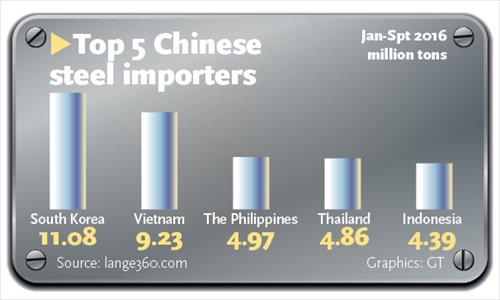
(Graphics/GT)
Trade protectionism will continue after new president takes office: experts
A day before the presidential election, the US Department of Commerce launched two new probes into whether Chinese steel mills are shipping metal to the U.S. market via Vietnam to avoid tariffs, The Wall Street Journal reported on Tuesday.
Experts said that regardless of who takes office, the U.S. will not ease its protectionist policies toward China in the coming years, which could negatively affect bilateral trade.
The investigations follow complaints filed by U.S. steel companies in September that Chinese steelmakers were shipping China-made steel to Vietnam for processing and then passing off the steel as Vietnamese, according to media reports.
The probes could lead to new tariffs on steel imported from Vietnam that originates in China under rules designed to prevent the tariff-evading practice, known as circumvention, said The Wall Street Journal report.
As of press time, China's Ministry of Commerce did not comment when contacted by the Global Times.
"The blame from the U.S. authority is not solid at the current stage and more evidence is needed to know whether the Vietnamese steel products that are believed to have originated in China come from independent Vietnamese companies or companies that involve Chinese investment in Vietnam," Wang Guoqing, research director at the Beijing Lange Steel Information Research Center, told the Global Times on Tuesday.
If those steel products were exported by Vietnamese steelmakers to the U.S. market in pursuit of profits, it is not fair to blame China, she said.
"Many Vietnamese steel companies import China-made steel products, but we do not know what these companies use the steel products for," Wang said, noting that in the first nine months of 2016, China exported 9.23 million tons steel to Vietnam, up 24.4 percent on a yearly basis.
It is hard for Chinese companies to control the usage of their steel exports in Vietnam, and it is possible that while some steel products are used for infrastructure in Vietnam, others may have been processed by Vietnamese firms and then exported to the U.S., according to Wang.
U.S. protectionism
Since 2006, the U.S. has launched numerous anti-dumping and anti-subsidies probes into Chinese steel products that range from nearly all low-end to high-end products.
No matter who takes office, the U.S. government will increase its protectionism on the sector to protect its own industry, according to experts.
It would be a hard time for the Chinese steel industry in the future if Donald Trump becomes president, because he has stated repeatedly that China has negatively impacted the U.S. steel sector, Wang noted.
The trade frictions between the two countries also extend beyond steel.
The U.S. authorities are also looking into whether China's aluminum producer Zhongwang Holdings improperly shipped aluminum through Mexico and transformed the metal at a plant in New Jersey to avoid U.S. import tariffs, The Wall Street Journal reported on October 26.
China Zhongwang has denied any improper activity and said that the company believes in fair, disciplined and orderly business competition. "It is China Zhongwang's policy to operate in compliance with all applicable international trade rules and government regulations for products it exports," the company said in a statement sent to the Global Times on Tuesday.
Future hope
Based on speeches during the election campaign by Hillary Clinton and Donald Trump, both candidates are against trade liberalization and are in favor of increasing protectionist measures toward China, neither of which are conducive to bilateral trade ties in the future, Chen Weidong, a professor with the law school at the Beijing-based University of International Business and Economics, told the Global Times on Tuesday.
"Although the two nominees made remarks about taking a protectionist stance toward China, they may not put their words into practice after taking office as the reality will make them adjust their policies," Chen said.
"We hope that the new U.S. president will send a positive message to China with respect to cooperation in bilateral trade, investment and regional security," he noted.


















































